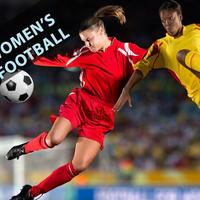Women's football World Cup: 6 Minute English - YouTube
Catherine: Hello. This is 6 Minute English I'm Catherine.
Sam: And I'm Sam.
Catherine: Now Sam, have you been
watching the World Cup?
Sam: Cricket or football? Because they
are both being played at the moment
Catherine: They are. Now I'm talking
about football, the Women's World Cup.
Sam: In that case, yes, I have. I've really
enjoyed it and it's been great that finally
we can watch the matches live on TV and
that there has been so much interest in
the media.
Catherine: We'll be finding out a little bit
more about the history of women's
football in England in today's programme,
but first, Sam, a question for you. When
was the first official woman's football World Cup?
A: 1970, B: 1988, or C: 1991.
What do you think, Sam?
Sam: Well I think I can get this through
mathematics rather than knowledge, so
I'm not going to say it right now, but I'll
tell you later.
Catherine: OK. Well I will tell you the
answer later in the programme. Now,
Gemma Clarke is a writer on women's
football in England and she spoke
recently on the BBC Woman's Hour
Programme. Here she describes the
reaction throughout the years to women's
football. Has it been easy for the women's
game in England?
Gemma Clarke: Women's football has
really been a struggle to play, to have any
kind of agency and to be taken seriously
as athletes. That can be seen throughout
history. I think every moment that
women's football has had, you know
there's been a kind of, a backlash
afterwards or a kind of an attempt to keep
women back and to dampen enthusiasm
for the sport.
Catherine: So, it's not been easy, has it?
Sam: No, she said it's been a struggle,
which means it's been difficult to make
any progress.
Catherine: And she also mentioned that
there was no agency in the women's
game. To have agency means
you have control over your own situation,
you can make the decisions you want to
make. So she's saying that the women's
game didn't really have control over its
own future.
Sam: Every time they had some success,
there was a backlash, there was a
negative reaction to their success.
Catherine: That's right and she goes on to
say that people tried to dampen
enthusiasm for the sport. They tried to
make it difficult to see and
enjoy it. So who tried to dampen
enthusiasm and how did they do it? Well,
during and after the First World War,
women's football became really popular
with crowds of up to 50,000 watching
games. It may have been popular with
the crowds, but it wasn't so popular with
the men who ran the game, the English
Football Association. Here's Gemma
Clarke again.
Gemma Clarke: The men's football
association were panicked by seeing
women doing so well and they banned
all women from playing football on
association grounds and that lasted for
about 50 years. It was a very concerted
effort to keep women's football at
amateur status and ensure that
there weren't crowds watching them play.
Catherine: So the men were really worried
by the success of the women's game.
They thought that it might take money
and supporters away from the men's game.
Sam: So they banned woman from playing on
their pitches. This means that they no
longer allowed them to use the pitches
any more. This effectively
killed the professional women's game as
up to then they had been using the same
facilities as the men.
Catherine: This, she says, was a concerted
effort to restrict women's football. When
you make a concerted effort to do
something it means that you try
really hard to do it.
I'm pleased to say that the ban on woman
using Football Association pitches was
eventually lifted, although only comparatively recently, in 1971.
Catherine: Right, before we review today's
vocabulary, let's have the answer to
today's question. So I asked you, Sam,
when was the first official Women's World Cup?
Was it… A: 1970, B: 1988, or C: 1991. And you said, Sam, that you were going to
work this out with maths – so come on
then.
Sam: I did! So, I know the World Cup is
held every four years, it's 2019 now, so the
answer must be an odd year – bear with
me - which makes it 1991. Am I right,
Catherine?
Catherine: Well we'll see if that
mathematical approach is any better than
actually just knowing the answer.
The first World Cup for women was
actually held in …..
Sam: Come on, hurry up! Let me out of
my misery.
Catherine: 1970
Sam: I can't believe I got that wrong.
Catherine: But, it wasn't an official
tournament. The first official Women's
World Cup was indeed 1991. Your maths
worked. So well done Sam and everybody
else who got that right. Now, before we
get to extra time and penalties, let's recap
today's vocabulary.
Sam: A struggle is how you can describe
something that is very difficult to achieve,
something you have to fight for.
Catherine: To have agency means being
able to act independently
and have control over your own choices.
Sam: A backlash is a strong negative
reaction to something.
Catherine: If you try to dampen
enthusiasm for something, you try to
make people less interested in it.
Sam: Banning something means using
certain powers to stop something from
happening.
Catherine: And finally, making a concerted
effort means trying really hard.
Sam: Well the final whistle has blown for
us today.
We'll see you again soon and don't forget
to look out for more from the
BBC Learning English team online, on social
media and on our app. Bye for now.
Catherine: Bye!

